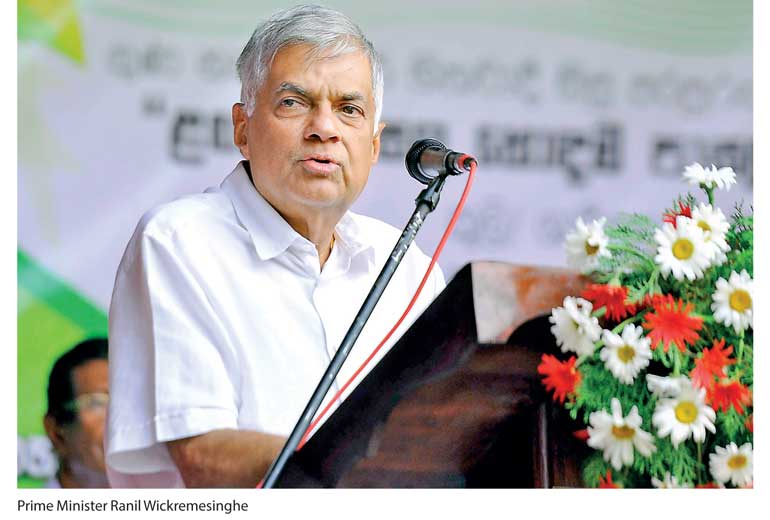Monday Feb 23, 2026
Monday Feb 23, 2026
Wednesday, 4 April 2018 00:00 - - {{hitsCtrl.values.hits}}

 “It is absolutely clear that the 19th Amendment has conferred on the Prime Minister a specially privileged position. He cannot be removed just because a Vote of No confidence has been passed against him.”
“It is absolutely clear that the 19th Amendment has conferred on the Prime Minister a specially privileged position. He cannot be removed just because a Vote of No confidence has been passed against him.”
Come Wednesday, 4 April, Prime Minister Ranil Wickremasinghe faces a crucial day in his long Parliamentary life. At this stage, predictions are terribly hard due to various complexities. However, it is possible that he may lose the vote of No-Confidence (VNC) brought in by the JO.
Whatever may happen, the move does not inflict terminal damage on the Prime Minister incumbent. In terms of the 19th Amendment he need not quit his role as Prime Minister as the passage of such a motion does not conform to the constitutionally-specified ways in which the Prime Minister can be removed.
The motion, if successful, would be even less than tantamount to a vote of No-Confidence in a Minister of the Government. In the latter instance, a Minister can be removed at any time and for no cause shown at the discretion of the President on the advice of the Prime Minister. A VNC in Parliament merely confers an ethical responsibility for the removal of the affected Minister; it is not a necessary reason.
It is distinctly different in the case of a VNC against the PM. A VNC passed by Parliament against the PM clearly does not accord with constitutional procedure that bears on the removal of the PM. It has no relevance for the PM’s tenure in Constitutional terms. The PM has to leave along with the rest of the Government and that, too, on the basis of passage of a NCV against the whole Government as set out in clause 48 (2) cited below.
There is no objection for bringing a vote of no confidence; but the constitutional fact is that the Prime Minister cannot be removed thereby. The Speaker has allowed the motion and that is right. However, the motion if passed cannot remove the Prime Minister. It could well be politically unprecedented and damaging to the PM; but that is another issue.
I produce the relevant clauses of the 19th Amendment in order to prove my point:
“46 (2) The Prime Minister shall continue to hold office throughout the period during which the Cabinet of Ministers continues to function under the provisions of the Constitution unless he–
resigns his office by a writing under his hand addressed to the President; (b) ceases to be a Member of Parliament
46 (3) A Minister of the Cabinet of Ministers, a Minister who is not a member of the Cabinet of Ministers and a Deputy Minister, shall continue to hold office throughout the period during which the Cabinet of Ministers continues to function under the provisions of the Constitution unless he–
is removed from office under the hand of the President on the advice of the Prime Minister;
resigns from office by a writing under his hand addressed to the President; or
ceases to be a Member of Parliament.”
How exactly a Prime Minister can go is laid down in the following clause:
“48 (2) If Parliament rejects the Statement of Government Policy or the Appropriation Bill or passes a vote of no-confidence in the Government, the Cabinet of Ministers shall stand dissolved, and the President shall, unless he has in the exercise of his powers under Article 70, dissolved Parliament, appoint a Prime Minister, Ministers of the Cabinet of Ministers, Ministers who are not members of the Cabinet of Ministers and Deputy Ministers in terms of Articles 42, 43, 44 and 45.”
Prime Minister’s special autonomy
It is easy to see the distinct difference in the way a Prime Minister can go and a Minister can go. The other significant thing about this legislation is that it affords the Prime Minister a special autonomy and special privilege unlike the situation before the 19th Amendment.
Ministers and deputies can be appointed by the President only upon the advice of the PM. This indicates the very special position of the PM, which the President cannot override. To this extent the President’s power is limited by the Prime Minister.
In fact, there is another clause which permits the impeachment of the President on the basis of a unanimous decision of the Chief Justice, PM and Speaker. Thus the PM can take part even in the impeachment of the President on specified grounds that include inability to perform.
On all these counts it is absolutely clear that the 19th Amendment has conferred on the Prime Minister a specially privileged position. He cannot be removed just because a VNC has been passed on him.